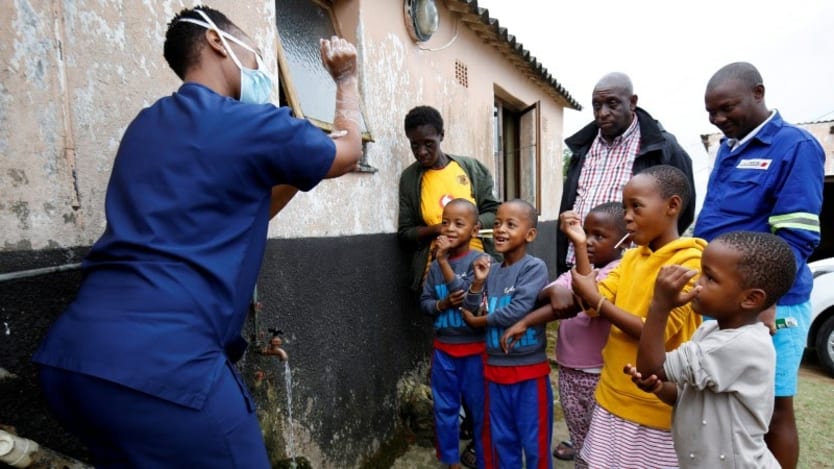
GLASGOW, Scotland — Ongoing lockdowns and travel restrictions around the world are just some of the challenges facing humanitarian and development organizations, making the COVID-19 response unlike any other emergency.
“We are really looking for people with experience … in similar responses or people who we can confidently say that they can deal with the difficulty of this response.”
— Azadeh Hasani, global humanitarian director, Relief InternationalMany organizations are reshuffling staff internally and using rosters to quickly deploy where possible, but they are also relying on experts working remotely to support their teams on the ground.
Get more on the headlines, facts, and information
We’ve removed our paywall for this article — previously for Pro subscribers only — to provide access to accurate information and resources during the COVID-19 outbreak.
At Plan International, country offices are in the middle of enterprise resource planning to identify programs that will not be deemed essential in the months ahead and staff members who could instead provide support to the response. Like many organizations, it is also looking to its internal and external rosters of prevetted professionals to speed up recruitment and deployment.
Meanwhile, UNICEF is tapping into its regional rosters, which in some cases include databases of consultants, and Relief International has set up a specific COVID-19 roster.
Azadeh Hasani, global humanitarian director at Relief International, said that while funding is important, the right expertise is also needed to ensure an effective response.
Devex asked these organizations, which are all currently hiring for the COVID-19 reponse, what sectoral expertise is most in-demand, where there will be opportunities to work remotely, and what previous emergency experience they are looking for.
Health and WASH expertise
Hasani said one top priority is health, which involves a wide range of activities such as working at the community level on readiness and awareness, setting up health facilities or isolation wards in existing facilities, and providing medical supplies and equipment.
“We are also, at the moment, prioritizing WASH [water, sanitation, and hygiene], protection and safeguarding,” Hasani said. The initial focus will be on adapting and scaling up efforts in countries where the organization is already supporting major health operations, such as Bangladesh, Afghanistan, Iran, and Yemen, she said.
Alicia Oughton, human resources business partner for disaster risk management at Plan International, said there might be an increase in the need for WASH expertise within the organization, which typically focuses on child protection and education in emergencies. It is already looking for WASH and public health experts as part of its response.
And Anne Favreau, chief of emergencies and surge recruitment at UNICEF, told Devex that while it was difficult to say exactly what skills will be needed, WASH and public health are areas that have seen hiring for previous emergencies, such as the Ebola response, and will likely be important in the coming months.
Continued focus on GBV, education, and areas of ongoing crisis
In addition to health and WASH, there might also be hiring around community engagement, child protection, and gender-based violence, Favreau said, as there is a need for these kinds of expertise in any emergency. There are fears that gender-based violence is already on the rise globally due to the lockdowns and additional responsibilities falling on young girls.
The effect of this crisis on girls is a huge concern, Oughton said. The potential impact of COVID-19 on camps for refugees and people displaced within their own countries means Plan International will also focus its efforts on areas where it is already working with these vulnerable groups. These include Bangladesh, the Sahel region, the Lake Chad Basin, the Venezuelan-Colombian border, and countries in the midst of humanitarian crises. Emergency specialists will be needed to help support these countries and those that are not so well-versed in responding to emergencies, she said.
Education, along with economic opportunity, is part of a Relief International’s six-month strategy, Hasani said. There are also discussions around potential food-security interventions further down the line. The organization is looking for ways to continue its education programs and has already adapted some of its activities in Jordan’s refugee camps for online learning, she said.
With much of UNICEF’s existing work focusing on Africa and Latin America, there will likely be a need for French and Spanish language skills as part of the agency’s response, Favreau noted.
Previous experience in emergencies
Emergency and logistics specialists will be in high demand, particularly those who have supported similar health-related emergencies. “We’re reflecting on the Ebola response that the organization was involved in in West Africa … looking at the measures and processes we put in place then,” Oughton said.
Favreau said that, in addition to the Ebola response, people who have worked on efforts to tackle cholera, HIV and AIDS, and polio would have valuable experience.
But Hasani stressed that it’s also critical to find people who will be able to support a “highly demanding” response, which could involve long hours wearing personal protective equipment, dealing with movement restrictions, and the psychological pressures these bring.
“We are really looking for people with experience … in similar responses or people who we can confidently say that they can deal with the difficulty of this response,” she said.
Remote skills
Travel restrictions will make it difficult to deploy staff in certain areas, and many organizations will first look to reallocate their national staff.
As with previous emergencies, UNICEF will be utilizing and benefiting from local expertise, Favreau said, but there is also hiring for international consultancy roles. Depending on how long the pandemic lasts and what restrictions are in place, there may be opportunities for both on-the-ground and remote roles, she added.
Looking to support the response to COVID-19?
According to Hasani, national expertise will be used where possible, but the situation is requiring the organization to look at different ways of ensuring that field teams have the support they need. Some roles will require the person to be on the ground but, for others, telecommuting could be possible. “For many of the positions and expertise, we are also considering this option,” she said.
Oughton suggested that the response will create a demand for remote management skills. The ability to adapt traditional approaches of community engagement — and to negotiate around access and dispensation, for example — will also be important.
In terms of leadership skills, the sector will need people who can take a holistic approach to supporting staff and recognize that they are facing COVID-19 on a personal level as well, she suggested.
We’ve removed our paywall for this article — previously for Career Account members only — to provide access to accurate information and resources during the COVID-19 outbreak.
Visit our dedicated COVID-19 page for news, job opportunities, and funding insights.









